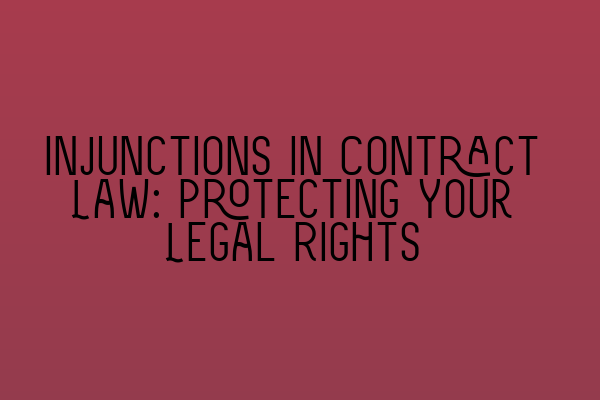Injunctions in Contract Law: Protecting Your Legal Rights
Contracts are the foundation on which business agreements are built. They outline the terms and conditions that govern the relationship between parties, ensuring that both parties uphold their obligations. However, even with the most carefully crafted contracts, disputes can arise. When these disputes occur, seeking legal remedies becomes crucial to protect your rights and interests.
One such remedy available in contract law is an injunction. An injunction is a court order that requires a party to take certain actions or refrain from certain behaviors. It is a powerful tool that can provide immediate relief and protect your legal rights. Let’s delve deeper into the world of injunctions and how they can play a vital role in securing your contract-based interests.
1. Types of Injunctions:
There are two primary types of injunctions that can be sought in contract law: the prohibitory injunction and the mandatory injunction. A prohibitory injunction restrains a party from engaging in a particular activity, while a mandatory injunction compels a party to perform a specific action.
For example, if a vendor breaches a contract by selling their products to a competitor, the aggrieved party can seek a prohibitory injunction to prevent further sales. On the other hand, if a construction contractor fails to complete a project on time, the affected party may seek a mandatory injunction to compel the contractor to complete the work.
2. Grounds for Obtaining an Injunction:
To be granted an injunction, you must demonstrate to the court that certain conditions are met. The fundamental requirement is a strong prima facie case, indicating that you have a high likelihood of success in proving that a contractual breach has occurred. Additionally, you must prove that damages would not be an adequate remedy and that the balance of convenience favors the grant of an injunction.
3. Preventing Irreparable Harm:
One of the key reasons why injunctions are sought is to prevent irreparable harm. In some contract disputes, monetary compensation alone may not be sufficient to rectify the damage caused. For instance, if a party discloses confidential information in violation of a non-disclosure agreement, no amount of money can undo the harm caused by the unauthorized disclosure. In such cases, an injunction can effectively prevent any further disclosure and safeguard your interests.
4. Temporary and Permanent Injunctions:
Injunctions can be temporary or permanent. Temporary or interim injunctions are sought at the beginning of legal proceedings, to provide immediate relief and maintain the status quo until the court makes a final decision. In contrast, permanent injunctions are granted once the court has considered all the evidence and made a final determination in the case. Permanent injunctions are typically granted when the court finds that a breach of contract has occurred and deems it necessary to enforce ongoing compliance.
5. Balance of Convenience:
The balance of convenience is a crucial factor that courts consider when deciding whether to grant an injunction. It involves weighing the potential harm that may be caused to the parties involved if the injunction is granted or denied. For example, if a construction contractor delays a project, the affected party may suffer significant financial losses. In such a scenario, the court may grant a mandatory injunction, finding that it is in the best interest of all parties to ensure the project’s completion.
6. Alternatives to Injunctions:
While injunctions are powerful tools in contract law, it’s important to note that they are not always the most suitable solution. In some cases, alternative dispute resolution (ADR) methods such as negotiation, mediation, or arbitration may be more appropriate. ADR methods can provide a quicker and more cost-effective way of resolving contract disputes, without the need for court intervention. Understanding the pros and cons of different dispute resolution methods can help you navigate your options effectively.
In conclusion, injunctions are an essential aspect of contract law that can protect your legal rights and ensure the enforcement of contractual obligations. Whether you are seeking to prevent harmful actions or compel necessary actions, obtaining an injunction can provide swift and effective relief. However, it is crucial to seek legal guidance to determine if an injunction is the best course of action for your specific situation.
If you’re interested in learning more about other aspects of a solicitor’s role and the skills necessary for success in the legal field, check out our related articles:
– Mentorship for Aspiring Solicitors: Nurturing Talent in the Legal Field
– Exploring Alternative Dispute Resolution: An Effective Approach to Legal Conflicts
– The Art of Contract Drafting and Negotiation: Skills Every Solicitor Should Master
– Navigating the Legal Practice Course (LPC): Your Path to Solicitor Qualification
– Mastering Client Care Skills: Essential for Solicitors
Whether you’re just starting your legal journey or looking to expand your knowledge, these articles provide valuable insights into the legal profession.
